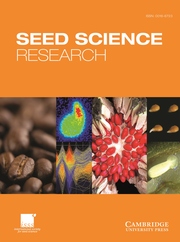No CrossRef data available.
Article contents
Phenotypic germination plasticity related to caryopsis size in Schismus arabicus
Published online by Cambridge University Press: 22 February 2007
Abstract
Schismus arabicus is a common annual grass occurring in the Negev Desert of Israel. Under unpredictable distribution and very small amounts of rain, as well as massive seed predation, this species has developed complementary sets of survival strategies that are influenced by biotic and abiotic environmental factors. One of these strategies is the phenotypic germination plasticity due to distinct caryopsis size groups. These groups occur in different percentages in the seed population, according to plant age at the time of seed development and maturation, but are not influenced by photoperiod. The size of the tiny, dust-like caryopses has an influence on the range of temperatures required for germination, the speed of germination and the final germination percentage reached between 5 and 30°C. These survival characteristics contribute to making S. arabicus one of the most common annual plant species in large areas of the Saharo-Arabian deserts and Irano-Turanian regions.
- Type
- Short Communication
- Information
- Copyright
- Copyright © Cambridge University Press 2001


